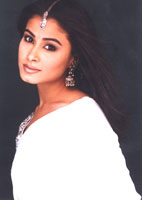
The Indian woman’s new mantra is: It’s my life, my
choice and my responsibility.
Savitri K, 58, was a housewife of the
old mould. Although educated, she opted full-time for home and family after
marriage, and got utterly taken for granted in the process. Then the kids flew
the coop, and she suddenly realised that she had nothing to show for all those
years except a husband who was busier by the day and couldn’t care less
about what she did.
One day, she accidentally met an old college
friend, who had started a community in the hills. Like-minded persons who got
together, built their own homes according to their needs and finances, worked
with the community, lived together.
Savitri was persuaded to join.
Her husband protested, raved and ranted, but for once, she had made her choice:
“I didn’t leave him in any emotional sense. I’m always there.
It’s just that I have chosen to live for myself now, after fulfilling my
duties.”
Today her husband, children and grandchildren come to
visit and stay; Savitri visits her husband whenever needed. The arrangement
suits all.
Savitri’s decision was made on an informed
choice.
It’s My Life
Malati Pandit*, a
banker-turned-housewife, says: “After five years in a leading bank, I
decided to quit because it wasn’t the way I wanted to live my life. To me,
quality of life goes beyond money.” She made her decision based on her own
needs, while taking family commitments into account as well. Thirty years later,
she has no regrets.
“It is people who make you feel worthless
if you’re not working. But my advice to all women is: Define yourself.
Don’t let others define you. For this you must have a deep sense of your
own self worth.”
Welcome to the world of latter day feminist
India with as many opinions as there are women. In their present new high, women
are discovering to their delight, that they have one thing in common — the
luxury of choice. And in a refreshing turnaround, they are busy remoulding their
lives to suit their individual needs.
The new age mantra of informed
choice is also resurrecting significant throwbacks. A TV company executive, who
observes the ‘karva chauth’ fast each year, much to the delight of
her mother-in-law, says, “I think it is a beautiful way of saying you
care. I call myself feminist, but my brand of feminism is my own. Basically,
anything I’m comfortable with.” The decision to keep the fast is
hers, based on how she chooses to express herself.
An IAS officer
from UP, says she made a conscious decision to adopt her husband’s name
after marriage. “It helped my integration into the new family. The gains
of earlier feminism empower, but don’t bind us to the same priorities. But
making such choices is hard, you get a lot of flak,” she
explains.
The Right
Choice



